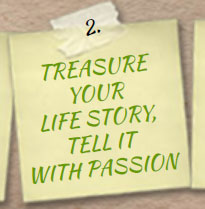
Your Story + Your Passion = Ideal Client Magnet
“So, how did you get started doing this work? What attracted you?”
When I thought I had to hide who I was, I hated answering this question! I had a stock answer, and gave it from memory, as if I were reading a mental note that got shorter and shorter over time.
Everything changed as soon as I began to embrace my story.
As I learned to talk about the obstacles I’ve overcome, I realized that it helps people understand how we’re connected. Everything became easier, more natural — and I began to welcome talking about it!
Then I discovered what happens when I let people to see the passion that underlies my story — and things changed dramatically!
People have so many choices nowadays that they just don’t stay where they don’t want to be. The truth is, we all close the books or turn off the movies we don’t understand, or that ramble with no point, don’t speak to us, don’t move us in some way. We’re not interested unless we “get” the appeal.
It’s not much different with your life story. Although your whole life brought you to today, it’s not all pertinent or interesting to your Ideal Client, so it’s important to work on your story as one part of your overall practice-building plan.
These are critical steps in telling your story with passion:
Uncover the important parts of your story.
Be ruthless in getting rid of the things that you love to talk about, even though they really aren’t necessary or don’t support the point! This is hard for many Feldenkrais® practitioners, because we love detail and find it endlessly interesting. The skill here is to determine which detail is important and which is distracting.
Learn to tell your story so that it’s compelling.
A great plot can suffer from bad telling. Just read any book that was written from the movie to see what I mean. To really engage people, you need to help them feel something from your story. That probably means you have to allow yourself feel it, too!
Practice telling it until it’s easy.
We’d all love to believe that if it’s real, we don’t have to rehearse it. Unfortunately, it just isn’t true. Most of us get smaller when we first think about telling a difficult story about ourselves. You can only make yourself bigger by practicing. Just like with our work — awareness doesn’t grow by being used once in a while.
Learn when to tell it.
Your story is a great story –– telling it can accomplish great things — like inspiring a new client or helping a group to connect with you quickly. Telling your story at the right times, and in the right places will help your Ideal Clients find you much more easily. Don’t squander it — know what it does and use it with intention.
Your story is a critical component of your business. And that means that if you learn to tell it with passion, you can do much more good with your work than if you hide it.
If you aren’t sure what your story should be about, or how to tell it, click here to find out what could change, if you and I worked together on it!
~~~~~
“It must be fully realized from the start that the learning process is irregular and consists of steps, and that there will be downs as well as ups” — Moshe Feldenkrais, in Awareness Through Movement, p. 8

